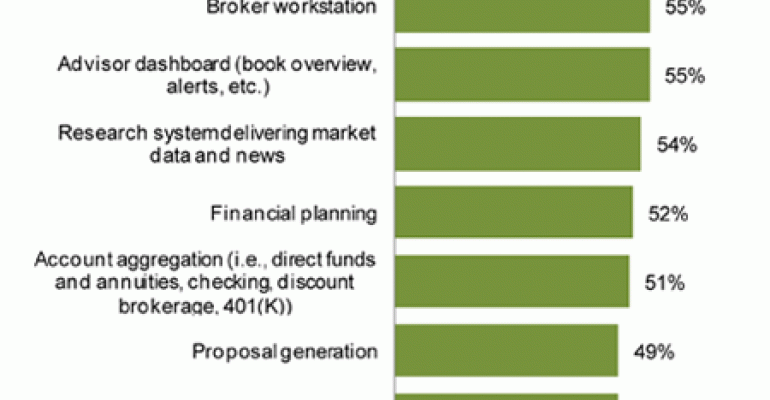Financial advisors are finally catching up with their clients in mobile computing. They are accelerating their use of mobile communications gadgets, and prepared to buy a whole lot more, according to a new survey by Aite Group. That emerged today as one in three FAs said they had recently switched from standard mobile to smart phones and tablet devices for accessing business applications, according to the survey.
Mobile computing has become a bigger FA budget item. More FAs today, says the survey, are prepared to spend $1,200 or more yearly, or $100 minimum monthly, to access various business applications from mobile phone or tablet devices. At least 20 percent of FAs would spend that sum compared with 13 percent polled in late 2008, according to Aite. Some FAs are prepared to spend a lot more: Between $200 to $499 monthly for five percent; $500 or more for four percent. (In some cases, for instance, insurance-affiliated brokerages and independent broker/dealers, the cost is traditionally passed along to clients, Aite notes. In others, the expense is absorbed by the employer.)
The faster adoption rate is not surprising, says Alois Pirker, analyst at Aite Group who authored the report. A seismic shift is underway. FAs are enthusiastic household consumers of mobile. But institutional pressure has held them back in business. Now they are scrambling to keep up with their mobile tech-laden clients. That as the floodgates suddenly open.

“Financial advisors who struggle with accessing applications on the go are often shown up by their clients on the mobile front,” according to the survey in Aite’s latest report, Efficiencies in Wealth Management: Mobile at the Gate. (An advance copy of the report, slated for publication today, was made available to Registered Rep.) “Many clients are equipped with mobile technologies that allow them to access the many information sources available on the Internet as well as rapidly take action on information, e.g., place buy or sell orders with their online broker through their mobile phone.”
One big producer at Merrill Lynch told Registered Rep. the changes in his own mobile computing practices, in the space of a few years, are remarkable. For instance, he works from home on Fridays, accessing the Merrill network via secure IDs and passwords. He can remotely access his contact management system, salesforce.com. Merrill websites and research are available via an application.
However, he said Merrill had a ways to go. “We are not at a point where we have the ability to see certain client information such as holdings and balances on an app, but we are moving in that direction,” he said. “And if we get an order from a client with an investment idea you would have to call the office. In my case, though, that works out fine.” A spokesperson for Merrill had no comment for this story.
Anita Sands, Chief Operating Officer of UBS Wealth Management Americas, in a recent interview with Registered Rep., says the UBS brokerage is taking a unique approach. “Unlike other firms that have developed one-off apps, we have decided to develop an open mobile platform which will allow us to put all kind of functionality and content on an iPad.” Sands added that the prototype would be launched as a product by the end of this year. (See, Anita Sands, Ten to Watch 2012, Registered Rep., August 2011.)
Back in the third quarter of 2008, a majority of FAs polled by Aite carried a standard mobile phone without Internet connections. Another 27 percent had BlackBerry phones; 15 percent had Palm devices. The iPhone, then on the market about 12 months, had a 10 percent penetration rate among FAs. By March 2011, 21 percent of FAs carried a standard mobile phone, that is a non-smartphone. That means one in three financial advisors has switched to a different mobile device since 2008. Palm is the big loser. One in four FAs has more than one mobile device, the survey says.
Aite Group describes a kind of corporate inertia for the recent dichtomomy between FA and client mobile usage. For one thing, companies like to measure their technology investment in years, rather than months. That makes it challenging for financial service firms to standardize a mobile device.

There is the risk of obsolescence. “Once a device is fully approved in-house, it may already have been replaced by a newer version,” according to Aite. “Advisors that have gotten used to one device and might be disappointed by the firm’s choice of another.” The alternative: Let advisors choose (and update) their own devices, says Aite. Of course, that makes some firms fearful business data will be blended with personal content. Aite says this might call for certain data security protection measures now commercially available.
Wealth managers who depend on FAs to serve clients have been among the slowest to adopt mobile technology. That is in part due to the fallout from the recent financial crisis as firms were preoccupied with merger-related integrations. Nevertheless, U.S. wealth management firms are now more readily embracing mobile technology. “U.S. wealth management firms have finally begun to take recent advances in mobile computing seriously,” according to Aite. “While consumers have been rapidly adopting smartphones and tablets, financial advisors have not, and therefore cannot access their business applications when away from their desks. Today, many wealth management firms have realized that these devices are a must for financial advisors, and are currently working on defining a mobile strategy.”
Aite Group polled a representative industry sample of 402 FAs in March for the survey. The Boston, MA.-based independent research and advisory said the respondents included wirehouses, regional firms, small broker/dealers and independent registered investment advisors (RIAs).


